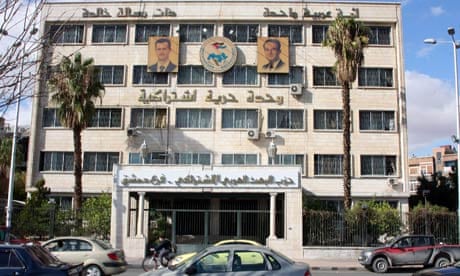Insurgents in Syria have launched the most audacious attack yet on the seat of power in the capital Damascus, targeting the offices of the ruling Ba'ath party.
Tilting the country closer to all-out civil war, insurgents fired two rocket-propelled grenades at the building. The Free Syrian Army, a collection of defectors fighting to overthrow President Bashar al-Assad, claimed it had carried out the attack.
Although the grenades appeared to have done little damage, they were a symbolic blow against Assad's regime – and appeared to demonstrate a new tactical capacity on the part of anti-government forces. Three days ago an air force intelligence complex was attacked in a Damascus suburb.
"Security police blocked off the square where the Ba'ath's Damascus branch is located. But I saw smoke rising from the building and fire trucks around it," one witness, who declined to be identified, told Reuters. "The attack was just before dawn and the building was mostly empty. It seems to have been intended as a message to the regime,"
In a defiant interview, however, Assad told the Sunday Times he would not bow to international pressure. Government troops would continue to target street protesters, whom he called "militants".Assad said his regime was fighting the "militants" to "protect civilians". He claimed the rebels were funded and armed from outside Syria.
"The conflict will continue, and the pressure to subjugate Syria will continue. Syria will not bow down," he said. "The only way is to search for the armed people, chase the armed gangs, prevent the entry of arms and weapons from neighbouring countries, prevent sabotage and enforce law and order."
The Arab League suspended Syria's membership last week, threatened economic sanctions unless Assad ends his crackdown on protests and insisted on sending an observer mission to the country. It will meet again on Thursday, to consider further ramifications of the regime's intransigence. Imposition of Arab sanctions would choke Syria's already gasping economy.
Assad, however, said the league's ultimatum was designed to pave the way for an armed foreign operation. "It's been done to show that there's a problem between the Arabs, thus providing western countries with a pretext to conduct a military intervention against Syria," he told the Sunday Times.
About 3,500 people have been killed since Syria's uprising began in mid-March, according to UN estimates. Opposition to Assad has transformed from street protests to units of well organised, armed men. The Free Syrian Army claimed Sunday's early-morning grenade attack was a response to the regime's refusal to implement the Arab League's peace plan, which calls on Damascus to free thousands of political prisoners and to remove the military from the country's restive cities, including Homs and Idlib. Activists say security forces may have killed as many as 15 people across Syria on Saturday.
There is no international consensus over a possible Libya-style military operation to defend civilians inside Syria. Russia and China remain vehemently opposed to the prospect of another Nato operation – with the Kremlin, a key military supplier to Assad, blaming the opposition for much of the violence.
There were signs on Sunday, though, that Turkey was taking an increasingly combative approach to its neighbour, and preparing for a post-Assad scenario. Turkish newspapers said on Saturday that Ankara was drawing up plans to create a no-fly zone or buffer zone to protect civilians if the conflict worsens. The Free Syrian Army's leadership currently operates from Turkey. Thousands of civilians have also fled across the border.
"It's almost certain Bashar al-Assad's regime is going down. All the assessments are made based on this assumption. Foreign ministry sources say that the sooner the regime goes down, the better for Turkey," one Turkish paper, quoted by Reuters, said.
Activists in Homs, meanwhile, said Farzat Jarban, an activist who had been filming and broadcasting pro-democracy rallies there, was found shot dead near a private hospital on Saturday.
"Security police are no longer just shooting protesters. They are targeting activists when they least suspect it, such as when they take their children to school. Sometimes they don't shoot to kill but to neutralise," a doctor from Homs who has fled to Jordan told Reuters. "I treated an activist recently … They shot him in the thigh and by the time his family got him to me gangrene had spread and his leg needed to be amputated," he said.
Tanks and troops were deployed in Homs after large anti-Assad protests six months ago. The authorities say they have since arrested tens of "terrorists" in the city who have been killing civilians and planting bombs in public places.
Dissident colonel Riad al-Asaad, organising defectors in Syria from his base in southern Turkey, denied Assad's allegations that adjacent states were allowing arms smuggling into Syria. Not a single bullet had been smuggled from abroad, he told al-Jazeera television. Weapons were brought by defectors, or obtained in raids on the regular army, or bought from arms dealers inside Syria, he said.
He said no foreign military intervention was needed other than providing a no-fly zone and weapons supplies, and more deserters would join the Free Syrian Army if there were protected zones to which they could flee. "Soldiers and officers in the army are waiting for the right opportunity," he told al-Jazeera.
